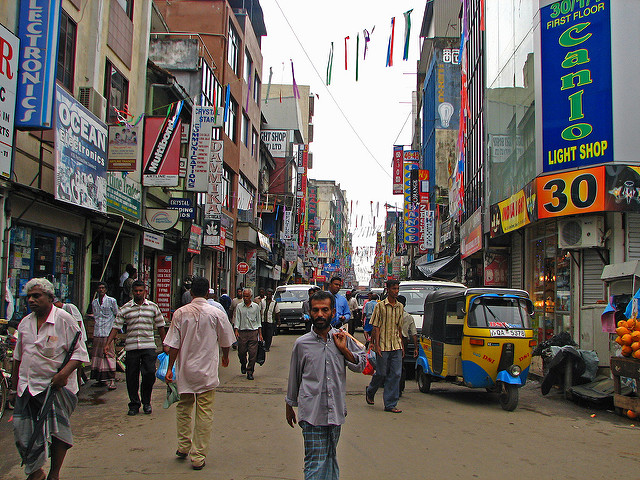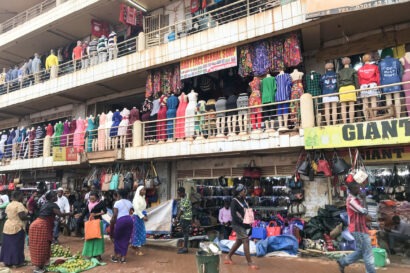Sri Lankans sometimes like to claim perverse records for their country. You will likely have heard the proud assertion that ‘Sri Lanka has the highest suicide rate in the world’. Fortunately, that is not true. But here is a genuine perverse record, of which few people are aware: Sri Lanka holds the world record for the longest and largest unplanned decline in government revenue collection. Over a quarter century from 1989, the ratio of government revenue collection to GDP fell by a half, from 21% to 10.4% (in 2014). The country really does have a revenue crisis. In recent years, the government has cut back severely on spending of all kinds, including on education. More urgently, it is now having to pay a higher rate of interest on the money it borrows because, with such large debts and low tax collections, borrowers are getting worried that it might be unable to repay its loans when they become due.
Happily, the current government has taken a number of emergency steps to try to raise more tax revenue, and some have succeeded. In the current financial year, the ratio of revenue to GDP might come back up to 12.9%. That is however still an extremely low figure for a middle income country with a fast-growing economy. It is not big enough. The population is ageing fast. Within a decade, there will be a growing number of old people who have few savings and no way of paying for their own health care. If the government does not raise additional revenue, it will be unable to step in and save its own citizens from a rather miserable old age.
It will have escaped no one’s notice that, while the government has achieved some success in raising additional taxes over the past 18 months, this has come at considerable political cost: rapid and humiliating policy reversals when ill-prepared proposals have met strong opposition; and continual protests against those revenue-raising proposals that are implemented – like the VAT increase and the additional charges on motor vehicle imports.
There is no easy solution to this problem. Taxes are never popular. They are however less unpopular in some places than others. In some countries – but rarely in Sri Lanka – voters are prepared to support taxes because they understand the broader benefits they can bring.
Resistance to new taxes is particularly high in Sri Lanka. One reason is that there is little tradition of informed public debate about either taxing or spending policies. Voters receive little reliable information about how the government raises its money or how they spend it. It is difficult for them to judge any claim that the government makes about the need for new revenue or about the distribution of the tax burden. How many people realise that total revenue collection has declined largely because the tax burden has been lifted from the rich while remaining on the poor? At the same time, spending on programmes that benefit the poor has steadily declined. The fiscal system has become heavily biased against the poor.
If voters were more informed about taxes and tax policies, they might become more willing to support progressive revenue raising policies. But it is not just ordinary voters who need exposure to informed debate. The same is true of the people who more directly shape government tax policy: Ministers, MPs, politicians and the staff of the Ministry of Finance and other economic ministries. Who says so? Among others, the distinguished authors of the 1968 Taxation Enquiry Commission. Here is their judgement on the quality of tax policymaking at that time:
“We believe that the right approach to the tax system of any country is an overall, integral, interdisciplinary approach under which each problem is studied from many angles – fiscal, economic, administrative, social, legal. We have failed to see in the tax system in Ceylon follow such a co-ordinated approach. On the contrary the tax system seems to have developed to satisfy the requirements of the moment rather than to fulfil the long-term policy objectives of government. The tax system also appears to have been at times the plaything of pressure groups, each seeking to achieve disjointed and often contradictory goals” (p. 50).
They explain the reason:
“We think that the basic fault lies in the lack of a centralised policy-making body responsible for taxation. The Treasury which has hitherto performed this function in addition to its numerous other duties is unsuited to undertake this task. It has neither the time nor the training staff nor the requisite organisation to fill this role. …. we have been given to understand that tax policy is considered by the Treasury usually once a year at Budget time and that too in a few hurried consultations with departmental heads. …. The task of revenue administration is at present left in the hands of several independent departments, the activities of which, though closely interrelated, not coordinated” (pp.50-51).
The Commission made two recommendations to overcome these problems. One was the creation of a Directorate of Revenue, under the authority of a Director-General of Revenue, to coordinate the various revenue raising departments. The second was the creation of a Permanent Taxation Commission to advise the Minister of Finance on tax policy issues on a continuing basis. The members would be senior economic officials and “two others not excluding members of the public” (p.57).
Every Taxation Commission that has reported since 1968 has endorsed some variant of these very sensible proposals. They have never been accepted by government. The quality of the tax policymaking process is no better today than in 1968. The difference is that Sri Lanka now has a real revenue crisis. It is time to put the 1968 proposals back on the table. They will not help to solve the revenue crisis in the short term. It will take time to appoint a Commission and even longer for the work of the Commission to have a positive impact on the ways in which the media present taxation issues, the ways in which Members of Parliament understand them, and the ways in which civil society organisations campaign about them. But the revenue crisis is not going to go away. Even if the government manages to raise sufficient additional revenue on a sustainable basis to assure potential lenders that it can repay loans, the longer term problem of the public spending implications of an ageing population will remain. And the tax system needs to be made more fair. It will be very hard to make the changes needed without at least some support from public and expert opinion. Informed debate would be the best way of generating that support.



